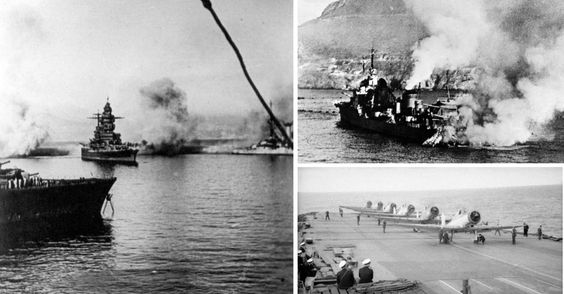Wednesday 3 July 1940
 |
| Destroyer Mogador beaching itself after having been hit by a 15-in round at Mers El Kebir, 3 July 1940. |
At 16:46, the Admiralty sends Somerville an order "to settle matters quickly." Somerville gives Gensou until 17:30 to choose an option. With no response, Somerville's force opens fire at 17:56. The gunfire continues for 15 minutes, including 15-inch shells. 23,936 ton French battleship Bretagne is sunk, with 977 killed. Battlecruiser Dunkerque is heavily damaged, with 210 killed, and also battleship Provence. The French lose 1,297 killed and 350 wounded.
Battlecruiser Strasbourg, aircraft carrier Commandant Teste and four destroyers that survive the battle later cross the Mediterranean to the naval base at Toulon under pressure from RAF attacks launched from the Ark Royal. Other ships follow. Both sides launch ineffective air attacks against the other's ships.
Vice-Admiral Sir Andrew Cunningham conducts negotiations in Alexandria with French Admiral René-Émile Godfroy about his battleship Lorraine and four cruisers. Godfroy is much more reasonable and not as much of a Vichy supporter. The situation is not as critical there because France is much further away and British power much stronger. The day ends with no conclusion there and negotiations continuing, but prospects are good.
Prime Minister Churchill regrets the whole affair, which is the first Anglo-French naval conflict since the Napoleonic Wars, and later says that he carries its "scars," but considers it absolutely necessary. He rejects a suggestion by First Lord of the Admiralty Dudley Pound that the Royal Navy should abandon the eastern Mediterranean altogether.
At Malta, the day begins with another air raid alert at 09:45, right on schedule. However, this is just a reconnaissance mission. The Italians lose an SM 79 bomber, while the British lose a Hurricane whose pilot is unhurt. Another raid at 17:55 causes no damage.
 |
| Mers El Kebir before the attack in 1940. |
The Admiralty suspends all shipping in the British Channel due to Luftwaffe attacks.
U-29 sinks British freighter Athelaird in the North Atlantic.
British submarine HMS Snapper sinks Norwegian freighter Cygnus.
HMS Coquetmouth (447t), which is used to keep Amble Harbor dredged, strikes a mine and sinks. Three crew perish.
German raider Komet departs Gdynia for Bergen. Its ultimate destination is the Pacific.
Convoy OA 178 departs from Southend, Convoy OB 178 departs from Liverpool, Convoy OG 36 forms off Gibraltar, Convoy HX 55 departs from Halifax.
USS Tautog (SS 199, Lt. Commander Joseph H. Willingham, Jr.) is commissioned.
European Air Operations: The Royal Air Force redirects its priorities from German industrial targets such as oil installations and airplane factories to German shipping and ports along the Channel coast.
The Luftwaffe raids Cardiff, Wales for the first time.
At around 15:00, three Ju 88s of I/KG51 attack the Portishead docks in Bristol, and some Dornier Do 17s from KG77 bomb the Kent area. Seven Dorniers go down.
At Maidenhead, a lone Dornier 17 attacks the aerodrome and destroys half a dozen Tiger Moths on the ground and damages 25 others.
The RAF's Fighter Command institutes standing patrols over the Channel.
The Regia Aeronautica has lost 60 aircraft to date.
North Africa: Acting Brigadier Ralph A. Bagnold, pursuant to previous orders from General Wavell, commences his long-range reconnaissance patrols with the Long Range Patrol Unit (LRP) in the desert with his "desert rats." They operate under the 8th Army and have two officers and 85 men, mainly volunteers from the 2nd New Zealand Division.
Exiled Abyssinia leader Haile Selassie, who had been in England, arrives in Khartoum to participate in the reconquest of his country from the Italians who have occupied it since 1935.
The Regia Aeronautica bombs a British base in Aden.
 |
| French ships under fire at Mers El Kebir, 3 July 1940. |
US/Latin American Relations: Heavy cruisers USS Wichita (CA 45) and Quincy (CA 39) complete their visit to Montevideo, Uruguay and head back to Brazil.
British Government: The Duke of Windsor, who has fled France, arrives in Lisbon from Madrid. He is widely believed to be pro-German.
Norway: The Norwegian parliament places pressure on King Haakon to abdicate, but he refuses.
Argentina: Presidente Roberto Maria Ortiz falls ill and delegates power to VP Ramon Castillo.
China: At the Battle of South Kwangsi:, the Japanese halt their offensive and both sides adopt a defensive posture.
July 1940
July 1, 1940: Vichy France
July 2, 1940: Arandora Star
July 3, 1940: Operation Catapult at Mers El Kébir
July 4, 1940: Romania In Crisis
July 5, 1940: The Five Freedoms
July 6, 1940: Hitler's High Point
July 7 1940: Dakar And Ringo
July 8, 1940: Tea Rationing in England
July 9, 1940: Battle of Calabria
July 10, 1940: Battle of Britain Begins
July 11, 1940: "Nous, Philippe Petain"
July 12, 1940: Enter Laval
July 13, 1940: German Surface Raiders Attack!
July 14, 1940: Bastille/Mourning Day
July 15, 1940: Tallest Man Dies
July 16, 1940: Plans for Sea Lion
July 17, 1940: Burma Road Closed
July 18, 1940: FDR Runs Again
July 19, 1940: Last Appeal To Reason
July 20, 1940: First Night Fighter Victory
July 21, 1940: Soviets Absorb Baltic States
July 22, 1940: First RAF Night Fighter Victory
July 23, 1940: Invasion False Alarm
July 24, 1940: The Meknés Incident
July 25, 1940: Black Thursday for RAF
July 26, 1940: Capture The Duke?
July 27, 1940: What's Up, Doc?
July 28, 1940: Destroyers Pulled From Dover
July 29, 1940: Barbarossa On The Burner
July 30, 1940: Hitler Delays Sealion
July 31, 1940: Bloody Wednesday of Olkusz
2020

No comments:
Post a Comment